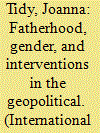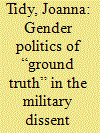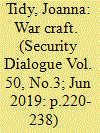|
|
|
Sort Order |
|
|
|
Items / Page
|
|
|
|
|
|
|
| Srl | Item |
| 1 |
ID:
158663


|
|
|
|
|
| Summary/Abstract |
War and peace are gendered and gendering geopolitical processes, constituting particular configurations of masculinity and femininity. When men are considered in relation to war and peace the majority of scholarly accounts focus on soldiers and perpetrators, typically observing their place in the gendered geopolitical solely through military/ized masculinities. In contrast, this article examines fatherhood as a masculine subjectivity, interacting in a nexus with other masculinities to produce an intelligible propeace intervention in war, and considers the implications for our understandings of gender and the geopolitical. To analyze this political subjectivity of what I term “paternal peace,” the article considers the case of Bob Bergdahl. Bergdahl’s son was a US soldier held by a Taliban-aligned group for five years until 2014. During this time Bergdahl was publically critical of US foreign policy, presenting his son’s release as part of a peace process that could end violence in Afghanistan. I unpack how Bergdahl’s public political subjectivity was the outcome of a “gender project” drawing on accounts of “valley” fatherhood in combination with particular forms of diplomatic and military masculinity. I consider how Bergdahl’s intervention was publically received, and how the geopolitical reach of it was pacified within gendered and racialized coding.
|
|
|
|
|
|
|
|
|
|
|
|
|
|
|
|
| 2 |
ID:
154038


|
|
|
|
|
| Summary/Abstract |
This article analyses the politics of “ground truth,” a premise central to the contemporary military dissent movement in the United States. Ground truth refers to the “truths” about war that soldiers who have experienced its realities can bring to bear on prevailing war narratives in order to disrupt them. The article identifies how the authority of ground truth is bound with accounts of gender and sexuality through which particular understandings of war (principally war as combat and violence) are reproduced. Examination of two prominent dissenting subject positions within the movement, the “(anti)war hero” and the “peace mom,” suggests that authority to oppose war is organized around the hegemonic military masculine figure of the warrior hero. Potentially more unruly war experiences, such as those of non-combat military personnel, remain obscured. I explore what perspectives and understandings of war might be revealed if we consider non-combat personnel as actively engaged in, and experiencing, war and discuss implications for dissent. The article therefore addresses how gendered power structures the ways in which war is known, understood, and also opposed through authenticity-based authority claims.
|
|
|
|
|
|
|
|
|
|
|
|
|
|
|
|
| 3 |
ID:
172341


|
|
|
|
|
| Summary/Abstract |
This article proposes a method for analysing museums as sites of intimate and colonially-produced international relations. Beginning with fieldwork that approaches museums as sites through which people intimately encounter the objects, institutions, selves and others of international politics, we explore how intimacy can be ‘read’ as socio-sexual affect, scales and proximities, and colonial differentiation/racialisation. The article is grounded in fieldwork at the British Army Royal Engineers Museum in Kent, UK, conceptualised as an assembly of, following Stoler, imperial debris. We explore how certain museum exhibits work as intimate ‘organising objects’, locating the museum collection, and those who visit or are excluded from it, within the intimate circulations of imperial and colonial violence. The article makes two core contributions: first, responding to recent literature in IR on museums we propose a framework for understanding how museums and exhibitions function as everyday sites of coloniality and racialisation. Second, we propose that approaching intimacy as a method is instructive for fieldwork in international relations (including museums) which takes the colonial constitution of the global/local seriously.
|
|
|
|
|
|
|
|
|
|
|
|
|
|
|
|
| 4 |
ID:
151649


|
|
|
|
|
| Summary/Abstract |
War experiences are a material of political currency, invoked, appropriated, and ‘written’ in particular configurations to sustain, complicate, and contest narratives about war. This occurs through and within the same relations of power that are intrinsic to the conduct of war as war-experiencing subjects comprise a political vocabulary of selves and others that populate and operate within war’s wider social (re)production. To track these power relations and consider implications for how dominant accounts of war can be complicated and contested, the article is grounded in an analysis of the visual regimes at work in footage, photographs, and testimony relating to the shooting of a group of people by an American Apache helicopter in Baghdad, Iraq in 2007. The event was publicised on a dedicated website and dubbed ‘Collateral Murder’ by WikiLeaks in 2010. Analysis of the website reveals how visual modes and the experiences of war subjects accompany each other, revealing war in contrasting locations of sight and violence: the ‘view from above’, the ‘view from below’, and the view of the ‘on-the-ground’ soldier eyewitness. Taken together these discursively produce ‘Collateral Murder’ and contest the dominance of war known through the experience of those who wage it ‘from above’.
|
|
|
|
|
|
|
|
|
|
|
|
|
|
|
|
| 5 |
ID:
165898


|
|
|
|
|
| Summary/Abstract |
This article makes the case for examining war from what Stephanie Bunn calls a ‘making point of view’. Makers and their material production of and for war have been neglected in our accounts of war, security and international relations. An attention to processes of making for war can reveal important things about how such processes are lived and undertaken at the level of the body. The article focuses on the particular phenomena of martial craft labour – the recreational making of ‘stuff’, including hats and pillowcases, by civilians for soldiers. To explore embodiment within this social site, an ethnographic method is outlined that enables the reading of objects as embodied texts, the observation of others in processes of making, and the undertaking of making by the researcher. Analysing embodied registers of aesthetic expression and the social values that attend such crafting for war reveals how this making is a space through which intimate embodied, emotional circulations undertake work for liberal-state and military-institutional logics and objectives, obscure violence, normalize war, and produce the military as an abstract social cause. Beyond the immediate empirical focus of this article, a much wider political entanglement of violence, embodiment and material production necessitates a concerted research agenda.
|
|
|
|
|
|
|
|
|
|
|
|
|
|
|
|
|
|
|
|
|